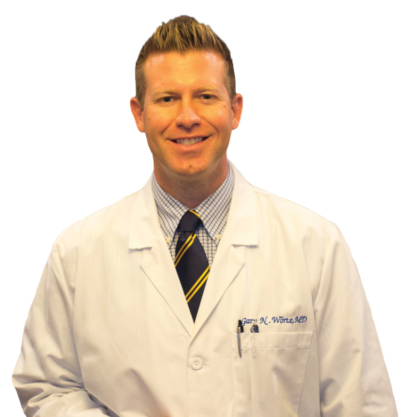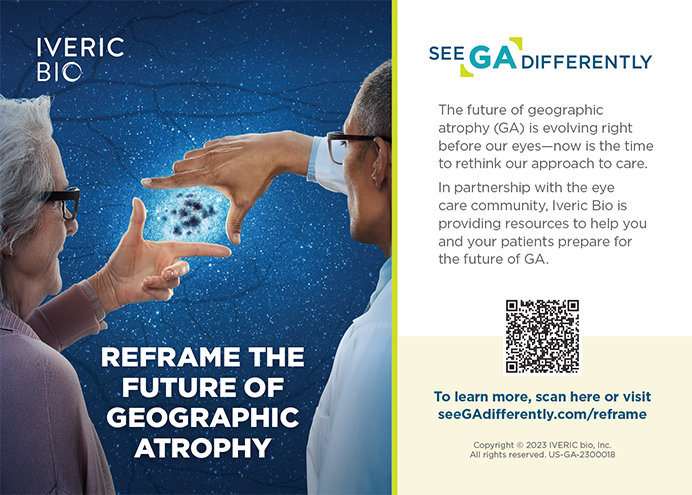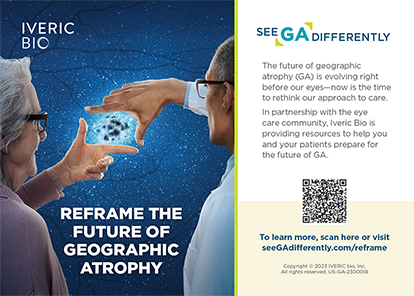Company: Omega Ophthalmics
Clinical Practice: Commonwealth Eye Surgery, Lexington, Kentucky
Claim to Fame: A habitual problem solver who created the Omega Gemini Refractive Capsule
Dr. Wörtz discusses his journey, balancing multiple priorities, and the inspiration for the Gemini capsule.

CRST: You’ve performed thousands of cataract surgeries. You’ve been a principal investigator for multiple FDA clinical trials, and you consult with many companies. You also work with CRST’s parent company, BMC, and publications such as this one. How do you balance it all?
Gary Wörtz, MD: I have an amazing family. My wife and I work well as a team. She takes care of a lot of things that I may not have time for. I also have good partners at work. When I’m at a meeting, they are doing hard work and preparing things for when I get back for surgery. There’s a whole crew of people who are allowing me to do these things.
Also, if you’re passionate about something, it’s almost like an itch you’ve got a scratch. For something that’s important to you, you find the time because it’s almost like you can’t not pursue it.
CRST: You have many competing priorities professionally and a family at home with whom you manage to spend quality time. Do you ever worry about burnout?
Dr. Wörtz: In medical school and residency, it’s almost like you don’t have the privilege to burn out. You realize that there is some goal at the end that you’re willing to push through for. You find that inner strength, or you develop it. That’s a double-edged sword. You feel you’ve overcome a lot of challenges, so no challenge is too big. Everyone, however, has a limit. Sometimes, you find it through failure or an inability to fulfill commitments.
I used to think burnout was something for weak people. Then, I realized it can happen to anyone. A sort of humility comes with understanding that we all have limitations. That’s when you start prioritizing projects, people, tasks, the type of work you want to do, and the things that fulfill you. When you’re doing things that align with your passion, you’re less likely to burn out.
I also think a healthy diet, exercise, and sleep are important to a balanced life.
CRST: What sparked the idea for Omega Ophthalmics?
Dr. Wörtz: I majored in chemistry. I like to think about why problems exist and how to solve them. While flying back from an American-European Congress of Ophthalmic Surgery (AECOS) symposium in 2011 in Orlando, Florida, I was pondering why there is so much variability in lens position and refractive results. I thought, if we could create some sort of foundation for a lens inside the capsule, we’d have a much better chance of getting more accurate refractive results. The capsular bag is a privileged space. It’s the thickest basement membrane in the human body—no nerve endings, no blood vessels, and devoid of a lot of fibrotic potential.
An old saying is that a problem well defined is nearly solved. The idea of the Gemini capsule crystallized—a 3D silicone ring that goes in, expands the bag, keeps that space open, and creates a nice foundation for a lens to sit on.
CRST: Who’s the first person you shared the idea with, and what was their feedback?
Dr. Wörtz: I called Stephen G. Slade, MD, FACS. I didn’t know him that well, but I admired him. I didn’t think he knew who I was, but he was gracious with his time, support, and encouragement. From the beginning, he thought it was an interesting idea and encouraged me to pursue it. Without that conversation, I don’t know that I would’ve taken further steps. I’m thankful to Steve.
CRST: Innovation is a long process. Where are you now?
Dr. Wörtz: We’re 12 years into the process. Almost 100 patients outside the United States are in various stages of trials. We are currently going through International Organization for Standardization certification of our device. The certification is basically a manufacturing standard that will allow us to produce medical devices ready for European Medicines Agency and FDA trials.
We are looking closely at using our device for drug delivery. We feel there’s real potential not only for taking care of cataract patients but other applications such as glaucoma where compliance is a big issue.
CRST: Do you ever worry about failure?
Dr. Wörtz: Fear of failure motivates a lot of people to overcome and achieve things in their lives. In college and medical school, I thought I failed every test I took. I always had a shadow that I was running from. What’s allowed me to get over the fear is realizing that I can’t control the outcome of much of anything in my life and that the only thing I can control is the process.
What allows me to sleep at night when I take risks, either as a surgeon or an entrepreneur, is holding myself to the highest standard. If I do my level best, that’s the only part of the equation I can control. I can live with whatever happens. That is how I have talked myself out of being so afraid of failing.
CRST: What prepared you for entrepreneurship?
Dr. Wörtz: Entrepreneurship is about finding an unmet need and solving a problem in a way that there’s a market for, and I’ve always been a problem solver. I am someone who enjoys that process.
I had people tell me I’d never make it. Getting into medical school and achieving other things encouraged me to believe in myself, which has been important for taking on new challenges.
CRST: Your family obviously believes in you, too. What does it mean to have their support?
Dr. Wörtz: That’s really everything. My wife and I got married right after college. We had kids while I was in medical school and went through some challenging times. It’s always been about us as a team and moving our family forward. We have found a good balance in how we take care of our family. What’s neat about that is my daughter’s going to Ohio State next year for optometry school, so she wants to join the family business. My son is pre-med and thinking about ophthalmology. If we can expand this team and create a family business, that will be fulfilling for me.
CRST: Where do you think Omega Ophthalmics will be in 5 to 10 years? Where do you think you’ll be in that time?
Dr. Wörtz: I think Omega Ophthalmics will have created a new platform that is exciting in ophthalmology, and I hope that it is approved in Europe and either approved or on the cusp of approval in the United States within 5 years. We really feel confident in the product that we have. It’s already been tested. We have 1-year safety data on it in 30 patients, and we know that it’s safe.
Personally, I’ll probably still be doing what I’m doing. I love the artistry of being a surgeon, helping patients, trying new technologies, and solving problems with new tools from industry. In 5 to 10 years, my kids will be working with me if I’m lucky.




